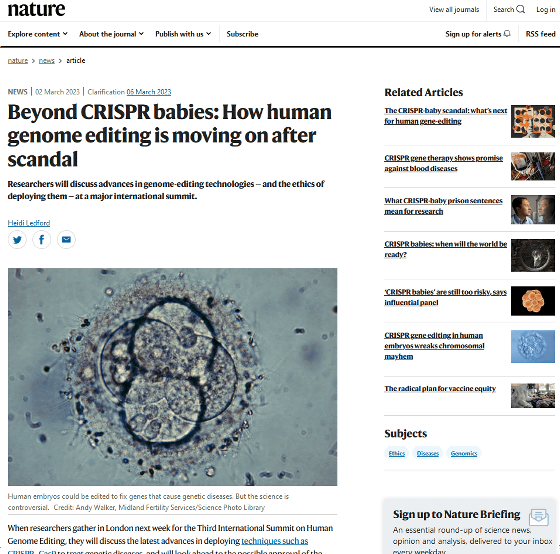How has genome editing technology progressed more than four years after the 'genome editing baby' scandal by Chinese scientists?

In 2018, Chinese scientist
Beyond CRISPR babies: How human genome editing is moving on after scandal
https://doi.org/10.1038/d41586-023-00625-w

The impact of the genome-edited baby scandal
In November 2018, prior to the 2nd International Summit on Human Genome Editing, Mr. He, who was an associate professor at Southern University of Science and Technology at the time, used CRISPR-Cas9 to study the genomes of twins resistant to human immunodeficiency virus (HIV) infection. We announced that we produced edit baby. Mr. Ha posted several videos on YouTube and appealed the significance and results of editing the human genome, but this research was criticized from an ethical and scientific point of view.
About Lulu and Nana: Twin Girls Born Healthy After Gene Surgery As Single-Cell Embryos-YouTube
The Chinese government ordered the team of Mr. He and others to stop the research , and Mr. He stopped appearing in public after the Chinese police started an investigation . In November 2019, it was reported that Mr. He went missing , but it is clear that Mr. He has since served time in prison and will be released in the spring of 2022 .
You can understand the series of events surrounding Mr. Ha and genome editing babies by reading the following article.
The unknown story of ``the scientist who gave birth to the world's first designer baby''-GIGAZINE

Scientists don't expect surprise announcements like He's at the 3rd International Summit on Human Genome Editing, but they wouldn't be surprised if other rogue researchers were secretly editing the human genome. I think. ``It wouldn't be surprising to see other children made with CRISPR-Cas9 in 2018 and in the next few years,'' Eben Kirksey, a medical anthropologist at the University of Oxford, told Nature.
Robin Lovell-Badge, reproductive biologist at the Francis Crick Institute and chairman of the 3rd International Summit on Human Genome Editing, sees a fundamental change in the technical aspects of genome editing that manipulate the genes of unborn babies. pointed out that there is no Human genome editing is a technology whose safety has not yet been ensured. Various potential issues remain, such as the danger of having a fetus with a birth defect.

At the time of writing, many countries, including the United States, do not have a robust governance framework to prevent genome-edited embryos from implanting. In February 2023, the Chinese government announced new guidelines on ethical conduct in biological and medical research. However, Joy Zhang, a sociologist at the University of Kent, said that the guidelines were aimed at hospitals, research institutes, and universities, and that they did not reflect the current situation in which cutting-edge research has become possible even in the private sector. indicate. 'We are ignoring the fact that more and more private ventures and even individuals are launching cutting-edge and potentially harmful research projects,' he said. 'We need to rethink how we govern.' said.
In fact, Mr. Ha said at a press conference after his release that he would conduct research on the treatment of hereditary muscular dystrophy in Hong Kong, and that he is approaching individual investors. “The bigger issue raised by He is not the making of designer babies per se, but the growing scientific practice outside the traditional scientific institutions,” Zhang said. Should I track it?' I commented.
◆Price problem of genome editing treatment
While embryonic human genome editing remains controversial, researchers who edit genomes in somatic rather than germ cells grapple with the conundrum of making genome-editing gene therapy widely accessible. As of 2018, there were few clinical trials of somatic cell genome editing therapy, but at the time of writing the article, there were more than 100, and Lovell-Badge said, ``There seems to be a new one every week.'' says.
However, the price of existing gene therapies is skyrocketing, and there is also concern that 'genome editing therapy will be similarly priced for only a small number of people around the world.' In fact, in November 2022, the US Food and Drug Administration (FDA) approved a gene therapy drug for hemophilia , but the price per treatment was 3.5 million dollars (about 480 million yen), which is the highest in the world. It is an expensive drug .
In 2023, regulators in the United States, United Kingdom, and the European Union are considering approval of CRISPR-Cas9 therapy for sickle cell disease , a genetic disease. Because it is so common, it may not be available to many patients if it is too expensive. Therefore, at the 3rd Human Genome Editing International Summit, a session will be held to consider how to ensure access to genome editing therapy in low- and middle-income countries.
Unexpectedly, efforts to facilitate access to genome-editing therapies in low- and middle-income countries may benefit from increased capacity to manufacture mRNA vaccines for the novel coronavirus disease (COVID-19). According to Nature, the mechanism used to deliver the mRNA contained in the vaccine to cells may also be used in genome editing therapy using RNA. 'Without the COVID-19 pandemic, we wouldn't be where we are today,' said Kiran Musunuru, a cardiologist at the University of Pennsylvania Philadelphia who studies genome-editing therapy. If I asked him if it was possible, he would have said, 'That would be great, but it's not possible.''

Related Posts:






